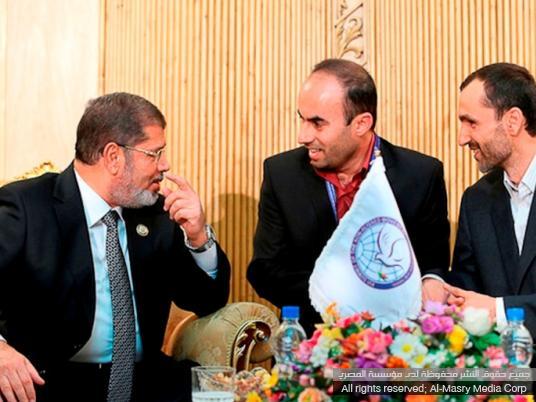 Bahrain recalled Iranian chargé d'affaires Mahdy Islamy on Saturday to officially protest official Iranian television's distortions of President Mohamed Morsy's speech at the Non-Aligned Movement summit in Tehran last week.
Bahrain recalled Iranian chargé d'affaires Mahdy Islamy on Saturday to officially protest official Iranian television's distortions of President Mohamed Morsy's speech at the Non-Aligned Movement summit in Tehran last week.
The interpreter for Iran's official television substituted all mentions of Syria in Morsy's speech with "Bahrain,” altering the meaning of Morsy's speech in which he criticized the ruling regime in Syria. When Morsy said, "The Palestinian and Syrian nations are struggling for freedom, justice and dignity,” the Iranian interpreter instead translated Morsy as saying "The Palestinian and Bahraini nations" are struggling for freedom.
Similarly, when Morsy talked about the "Arab Spring" which started in Tunisia and then spread to Egypt, Libya, Yemen and Syria, the interpreter spoke of an "Islamist Awakening" and again replaced Syria with Bahrain.
Al Jazeera’s satellite channel said the Bahraini Foreign Ministry issued a statement in which it said, "Inserting the name of Bahrain in the place of Syria in the speech is a distortion and falsification of it that constitutes unacceptable media performance. It points out that Iranian media intervene in the interior affairs of the Bahraini kingdom and violate established rules."
The Bahraini foreign ministry called on the Iranian government to apologize and to adopt the necessary measures against the interpreter in question.
Mohamed Shouman, a professor of political discourse and media at Ain Shams University, called on Egypt to officially protest the distortion of Morsy's speech. Describing the misinterpretations as a political, ethical and media scandal, Shouman said that the incident was part of a systematic approach to distort public opinion in Iran.
“This is brainwashing, reminiscent of the black propaganda launched during the Cold War,” he said.
In his speech, Morsy told Non-Aligned Movement members states that they should support the Syrian revolution against President Bashar al-Assad, who he called a “tyrant” that has lost legitimacy. Morsy also called for a civilian state in Syria.
Morsy mentioned a four-country initiative — comprising Egypt, Saudi Arabia, Iran and Turkey — he has proposed to help resolve the Syrian crisis.
A day later on Sunday, Syrian state television criticized Morsy, describing his Thursday speech as “uncivil.”
A television presenter said “there is no need to discuss what Morsy said,” as Syria has already weathered attacks from entities more important than Morsy. “But their chattering has not frightened our people, and the Syrian army does not care what they say,” the presenter added.
The anchor also said Morsy’s comments were inappropriate at a summit for countries who are supposed to be non-aligned, and accused him of being “completely biased.”
“How does the Egyptian Army have the right to use tanks against terrorists within some tribes in the Sinai, while Morsy describes what terrorists do against the Syrian regime and army as resistance and struggle?” the presented asked.
He also accused US Secretary of State Hillary Clinton and Qatari King Hamad bin Isa al-Khalifa of being behind Morsy’s attack on Syria.
The Iranian state television broadcast contained several further distortions of Morsy’s speech. When Morsy criticized Russia and China's use of the veto to prevent the issuing of a Security Council resolution against the Assad regime, Morsy was misquoted as saying that the Security Council veto prevented it from addressing the “crises of popular transformations,” a reference to regional uprisings in general.
Additionally, when Morsy said, "We express solidarity with the Syrian people against oppression and suppression,” Iranian television viewers were told that Morsy said, “We express solidarity with the Syrian people against the conspiracy organized against that country.” And when Morsy described "the unity of Syrian opposition” as “a necessity,” the interpreter said, "We hope the Syrian regime, which has a popular base, remains."



